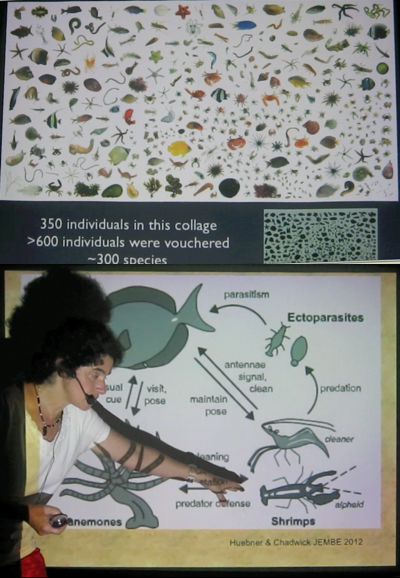Several leading marine ecology researchers met on Saba this month, writes The Daily Herald, each presenting their work in public “Sea and Learn” lectures on marine diversity while also conducting research activities with interested participant groups.
Biodiversity scientist Dr. Seabird McKeon held an entertaining and informative lecture on “Crabs and Crustaceans” October 15, at the Cottage Club in Windwardside. McKeon is a natural historian affiliated with Smithsonian Institute, concentrating on the systematics of bio-diverse marine communities. His research sheds light on the unique role of multi-species mutually beneficial relationships, the facilitation of survival services among them and most importantly the diversityenabled resilience to environmental challenges. His humorous yet data-filled presentation could just as well have been about life on the diverse and resilient community of tiny Saba. He defined biodiversity as inclusive of environmental, landscape, down to organismal but also genetic and even behavioural diversity. The study of this systemic interdependence looks at the resilience of such diverse communities and why different traits in species each play unique roles essential for a thriving community. He explained the design of ecological models and how studied interactions predict larger scale outcomes. Using cards games he explained how the natural circumstance has to match the cards you are dealt, determining if traits are redundant or allow for functional diversity. McKeon used this framework to relay the core findings of his various studies on mutually beneficial relationships between different crabs and coral species protecting each other from predators. In order to get the local crowed involved in furthering the understanding on Saba’s biodiversity, McKeon created a webpage for Saba on Inaturalist.org allowing anyone to upload geo-referenced photos and information about sightings of various species.
Ecologist Dr. Tamar Goulet lectured on a similar topic during an evening event at El Momo Cottages on Booby Hill on October 17. Her presentation titled “Symbiosis in the Sea” focused on her coral reef research and how different species combinations of coral and fish influence the evolution of ecology. She presented on various genetic techniques used in her work on how climate change affects the physiology of marine symbiosis. Locals in the audience asked about the impact of the alien lionfish invasion on the delicate balance between on the local fish, shrimp and coral symbiosis. Dr. Goulet talked about current efforts to study the actual impact of this invasion and the ability of the ecosystem to adapt. She addressed the local challenge with revitalizing the elk-crown coral describing methods to diversify the genetic pool of the coral. Others asked about the chain reaction that triggered the coral bleaching. Dr. Goulet said that while all organisms change through time, these changes nowadays are too rapid with manmade stresses impacting at a critical scale. The lecture pointed to symbiosis being a spectrum that can range from mutualism to parasitism depending on environmental conditions and life stages. She pointed to the queen conch survival symbiosis with algae in early development leading to parasitism in later life stages.

 Archive of posts from Saba-News.com Archive Saba News
Archive of posts from Saba-News.com Archive Saba News